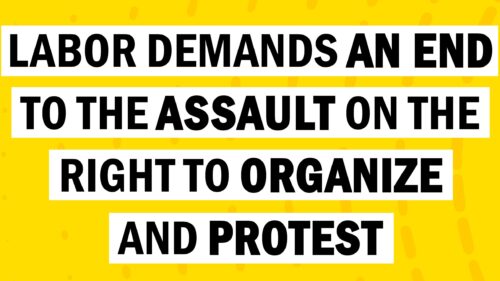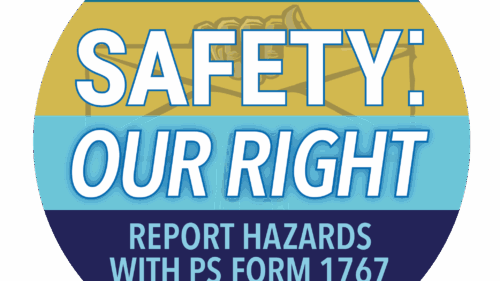APWU
Congress Moves to Gut Postal and Federal Pensions — APWU Calls for Immediate Action!
May 1, 2025On April 30, the House Committee on Oversight and Government Reform approved a number of significant cuts to the retirement benefits of postal and federal workers. Passed by a slim margin of 22-21, this measure will now be included in the full reconciliation package which Republican leadership is aiming to hold a full House vote on sometime this month. The retirement cuts would have devastating implications for APWU members, including:
On April 30, the House Committee on Oversight and Government Reform approved a number of significant cuts to the retirement benefits of postal and federal workers. Passed by a slim margin of 22-21, this measure will now be included in the full reconciliation package which Republican leadership is aiming to hold a full House vote on sometime this month. The retirement cuts would have devastating implications for APWU members, including:
Eliminating the FERS annuity Social Security supplement, which allows workers who have earned their retirement the ability to retire before their Social Security benefits begin;
Increasing the FERS annuity contribution rates for all active employees to 4.4%;
Replacing the High-3 FERS annuity calculation with a High-5 calculation, resulting in a reduction in annuity payments.
Also included in the passed were egregious attacks on federal employees, such as:
Charging a filing fee for Merit Systems Protection Board Claims and Appeals, and
Forcing new hires in the federal workforce to choose between at-will employment or paying an increased FERS contribution rate of 9.4%. While this specific proposal does not currently apply to postal workers, it is a dangerous change to eliminate job security and protections from government service.
“Make no mistake, Congress’ outrageous proposal intends to finance tax-cuts for the oligarchy with money from postal and federal workers’ paychecks,” said APWU President Mark Dimondstein. “We must act quickly and with the full force of the labor movement and our union membership to protect our pensions.”
With a slim majority in the House of Representatives, and united Democratic opposition, we need only a handful of pro-labor Republicans to stand up and fight back against these attacks on the pensions of postal and federal workers. We were greatly encouraged by Representative Mike Turner (R-OH-03) who voted against this package because “making changes to pension retirement benefits in the middle of someone’s employment is wrong.” APWU looks forward to working with Representative Turner, and other labor allies on both sides of the aisle, to defeat these attacks.
“The time to act is now to save our pensions,” said APWU Legislative and Political Director Judy Beard. “We are actively engaging with lawmakers on this fight, but need each and every APWU member to pick up the phone and call your member of Congress. Tell them to keep their hands off our pensions!”
On April 30, the House Committee on Oversight and Government Reform approved a number of significant cuts to the retirement benefits of postal and federal workers. Passed by a slim margin of 22-21, this measure will now be included in the full reconciliation package which Republican leadership is aiming to hold a full House vote on sometime this month. The retirement cuts would have devastating implications for APWU members, including:0
Read More....How to Receive One-Time Retirement Incentive Checks
April 29, 2025The incentive checks will be sent to the employee’s office of last appointment. From there, the retiree can pick it up from the office or it will be mailed from the office to the address indicated on the PS 3077 -Request to Forward Salary Check form.
PLEASE NOTE: The incentive checks will be sent to the employee’s office of last appointment. From there, the retiree can pick it up from the office or it will be mailed from the office to the address indicated on the PS 3077-Request to Forward Salary Check form.
Full-time career postal employees who chose optional retirement or retirement pursuant to a Voluntary Early Retirement (VER) as a result of the mutually agreed APWU-USPS One-Time Retirement Incentive Memorandum of Understanding (MOU) dated Jan. 13, 2025, will be paid as follows:
$10,000 to be paid on August 15, 2025.
$5,000 to be paid on August 28, 2026.
Part-time employees were also eligible for the incentive and will receive a prorated amount as outlined in the MOU.
The incentive checks will be sent to the employee’s office of last appointment. From there, the retiree can pick it up from the office or it will be mailed from the office to the address indicated on the PS 3077-Request to Forward Salary Check form.
Employees taking advantage of the incentive should complete the form, which provides the address where they would like the check sent (usually their final check/terminal leave) and give it to their manager/supervisor.
Then, when the check arrives at the postal unit, the manager will mail the check to the address provided by the employee.
The MOU states:
Any employee who is eligible for these incentive payments will complete PS Form 3077, Request to Forward Salary Check, and submit to their employing office. The incentive payments will be distributed to the address provided by the employee.
Documents Regarding 2025 One-Time Retirement Incentive Checks
2025-01-13 MOU Re: One-Time Retirement Incentive
PS Form 3077 Request to Forward Salary Check
The incentive checks will be sent to the employee’s office of last appointment. From there, the retiree can pick it up from the office or it will be mailed from the office to the address indicated on the PS 3077 -Request to Forward Salary Check form. The incentive checks will be sent to the employee’s office of last appointment. From there, the retiree can pick it up from the office or it will be mailed from the office to the address indicated on the PS 3077 -Request to Forward Salary Check form. 0
Read More....2025 APWU Retirees Fillable Application Form
https://apwu.org/sites/default/files/2025_retiree_membership_application.pdf2025 Retiree Application
Read More....
Celebrating May Day 2025 – International Workers’ Day
April 29, 2025May Day, the annual holiday recognizing the international working class, will be celebrated around the world on May 1. We encourage APWU members to join our labor allies across the country at one of the many May Day events happening to combat the attacks on the working class – our wages, our benefits, and our dignity.
A Brief History of May Day
In the 1880s, Chicagoans were fed up with the status quo, where industrial workers toiled long hours in squalid conditions. The International Working People’s Association formed in 1883 and dedicated its resources to establishing an eight-hour work day. Led by Albert Parsons and August Spies, demands for an eight-hour day swept the nation.
At the American Federation of Labor’s 1884 convention, delegates adopted a resolution urging all workers to strike two years later, on May 1, 1886 and on that day more than 340,000 workers took part in national actions in support for an eight-hour day.
Two days later, activists organized a union action at the McCormick Harvesting Machine Company, where scabs had replaced locked out workers on strike. Police arrived to intimidate the strikers, beating them with billy clubs. As protestors exited, police ran at them and fired into the retreating crowd, killing at least six and injuring many more. In the coming days, tensions escalated between police and workers.
The following day, on May 4, labor leaders organized a rally in Haymarket Square. While the event was meant to be a non-violent protest of police brutality, it became violent, ultimately leading to the deaths of several civilians at the hands of the police, fellow officers, and dozens more injured.
News of the tragedy sent shockwaves through the labor movement worldwide. In 1889, labor advocates declared May 1 International Workers Day – or May Day – to commemorate the struggle of the Haymarket Affair and to build international workers’ solidarity.
Highlighting the Significance
Read More....
Labor Demands and End to the Assault on the Right to Organize and Protest
April 28, 2025The labor movement holds one value above all others: solidarity. Labor demands an end to the Trump administration’s assaults on immigrant workers, freedom of speech, the right to organize and bargain, and federal government workers, their unions, and the services they provide.
The labor movement holds one value above all others: solidarity. Labor demands an end to the Trump administration’s assaults on immigrant workers, freedom of speech, the right to organize and bargain, and federal government workers, their unions, and the services they provide.
We will not stand by as President Donald Trump terrorizes immigrant workers with abduction, detention, and confinement without due process in unmarked facilities, far-flung detention centers, and a notorious prison in El Salvador.
The attacks are ramping up, and we need to act fast. In Washington state, Immigration and Customs Enforcement agents smashed a car window and detained farmworker Alfredo “Lelo” Juarez, a leader in the berry-pickers union Familias Unidas por la Justicia, on his way to drop off his partner at work. They locked up SEIU Local 925 member Lewelyn Dixon, a lab tech at the University of Washington, when she returned from a family trip. They raided a roofing company where workers recently went on a safety strike, and arrested 37 people.
In Massachusetts, federal immigration agents snatched Rumeysa Ozturk, a graduate student at Tufts University on a student visa and an SEIU Local 509 member, on her way to break her Ramadan fast. She had written an op-ed in the student newspaper in support of Palestine.
In Baltimore, they arrested sheet metal worker Kilmar Armando Abrego Garcia, a SMART Local 100 apprentice and father of a disabled child, and sent him to El Salvador’s nightmarish prison—then they called it an “administrative error” and said they could not get him back.
In New York, they abducted Mahmoud Khalil, a recent Columbia University graduate and United Auto Workers Local 2710 member, for protesting Israel’s assault on Gaza. They have also taken many others whose names aren’t public yet.
This administration attacked these members of our communities on their way to work, on their way to worship, on their way home. They locked them up after speaking their minds. And they did that on purpose.
They have also threatened and intimidated university administrations in an effort to enlist them in suppressing dissent. Sadly, many have acquiesced to these demands, making a mockery of the concept of “academic freedom” and the free exchange of ideas. Students have been suspended and expelled. Faculty members have been disciplined and discharged.
Further, the mass firings of federal workers and the attempt to abolish their collective bargaining rights are attacks also on the services they provide and the very function of our government. Trump wants a government that only serves the interests of corporations and oligarchs. Rather than a government of, by, and for the people, he would create one by and for the privileged rich. He wants to create a culture of fear.
We must not bow to any of it.
Labor Demands and End to the Assault on the Right to Organize and Protest0
Read More....WestPac SDC Launch List 04-23-25
Wednesday, April 23, 2025Western AreaWestern westpac_sdc_launch_list_04-23-25.pdfWestPac SDC Launch List 04-23-25
Read More....Let’s Get to The Truth: Myths and Facts about Postal Privatization
April 22, 2025Let’s Get to The Truth: Myths and Facts about Postal Privatization
US Mail Not for Sale
No matter how you voted in last year’s election, no one voted to destroy the Postal Service. But the new administration plans to break up the Postal Service and sell it off to private corporations. Here’s what you need to know and what you can do to help save the Postal Service.
MYTH: The USPS loses billions of dollars each year in taxpayers’ money.
FACT: The Postal Service is self-funded and relies on revenue generated from the sale of stamps, products, and services to pay for its operations.
MYTH: The USPS is obsolete because letter mail volumes have steadily declined in the digital age.
FACT: The Postal Service is 250 years old and has always adapted to new technology and mail-mix. While letter mail is down, package volumes are up. Additionally, the Postal Reform Act of 2022 allows the Postal Service to offer new services to local government. These and other expanded services like postal banking, could underpin USPS finances for generations to come.
MYTH: The USPS isn’t profitable, so it should be run like a business.
FACT: The Postal Service is not a business; it is enshrined in the constitution and has a congressionally-mandated obligation to serve the people by delivering to all 169 million addresses, urban or rural, six days a week.
MYTH: If the mail was run by private companies, the universal service obligation would still exist and the Postal Service would deliver to every address.
FACT: Delivery would be driven by profit margins, and private companies will only go to where they can make a profit. Sections of our population could lose mail service entirely. Prices would rise according to whatever the company demands for their own profit.
MYTH: Moving the USPS under the Commerce Department would mean it is still a public agency, and not subject to privatization.
FACT: Moving the USPS under the Commerce Department would be a step backwards, giving power back to the Executive Branch and removing the independent governance that allows us to serve America free from political interference. It could also affect labor union contracts, vote-by-mail initiatives, and much more. Trump-appointed Secretary of Commerce Howard Lutnick would be in charge. He has already expressed interest in privatizing the Postal Service. This administration intends to break up and sell off the profitable portions of the Postal Service to billionaires and USPS competitors.
Understanding The Facts: Our public Postal Service
Support and protect your public Postal Service. Sign our petition at usmailnotforsale.org/petition.
FACT: The Post Office is enshrined in the US Constitution and created by an act of co Congress. The public Postal Service is part of the fundamental infrastructure of our great nation binding us together.
FACT: By law, the USPS is self funded. It operates through the sale of postage and and postal services alone, without tax dollars.
FACT: The Post Office will celebrate its 250th anniversary in July. Let’s work together to to bring another 250 years of strong, public postal services for every American!
FACT: The USPS delivers to every address in the country—169 million addresses and and 318 million pieces of mail each day—no matter who we are or where we live. In contrast, private delivery companies will only go where they can make a profit.
FACT: If the Administration’s plans to sell the USPS to corporations for private a goes through, it will result in higher costs, reduced delivery days, and the end of universal delivery to every address in the country.
FACT: The USPS is the low-cost anchor of the giant mail and package industry. bla The industry employs more than seven million people and generates more than $1.2 trillion in economic activity. At a time of booming e-commerce, the public Postal Service is as necessary as ever.
FACT: The United States Postal Service is consistently ranked among the most favorable favorable and most trusted federal agencies.
FACT: Postal privatization wouldn’t just be the end of reliable mail delivery, it woould would destroy over 600,000 good union jobs. The USPS is also the country’s largest civilian employer of veterans. Good jobs build good communities.
Download a Copy of this Fact Sheet
2025 Hands Off Our Postal Service Leaflet for Actions [ENGLISH]
Let’s Get to The Truth: Myths and Facts about Postal Privatization0
Read More....
Remember the Past, Fight for the Future this Workers’ Memorial Day
April 28, 2025Each year, April 28 is a significant day for workers and unions worldwide. Known as Workers’ Memorial Day, it is the day to honor workers who die or are injured on the job each year. It is a day of action, reflection, and mourning for workers and unions. We encourage members to recognize the day by reporting hazards in the workplace using a PS Form 1767.
Speak Up for Safe Jobs
In 1989, the AFL-CIO declared that April 28 would be celebrated each year as “Workers’ Memorial Day” to remember workers who were injured or died on the job and renew the fight for safety and protections at work. The date is intentional – April 28 is the day that the Williams-Steiger Occupational Safety and Health Act of 1970 was signed into law. This act, which unions led the fight for, created the Occupational Safety and Health Administration (OSHA), the body that establishes and enforces standards for safe and healthy working conditions. Tony Mazzocchi, a labor leader in the oil Chemical and Atomic Workers International Union (OCAW), led this fight by aligning the environmental and labor movements to pass this crucial piece of legislation.
Until OSHA was created, workers didn’t enjoy any formal, enforceable standards for safety and health in the workplace. OSHA set a standard for all employers – public and private – to protect workers on the job. Data from the Bureau of Labor Statistics proves that OSHA works. Since OSHA’s implementation, injuries in the workplace have fallen from 10.9 cases per 100 workers in 1972, to 2.8 cases per 100 in 2018.
OSHA protects workers against bosses who want to put profit over safety. Time and again, corporations have tried to get OSHA repealed, and this year is proving no different. On Sunday, Feb. 2, 2025, U.S. House Representative Andy Biggs (R-AZ-05) introduced a bill that would abolish OSHA . Bigg’s bill, which he named the Nullify the Occupational Safety and Health Administration (NOSHA) Act, demands that “The Occupational Safety and Health Act of 1970 is repealed. The Occupational Safety and Health Administration is abolished.”
Removing OSHA is dangerous for many reasons. Among other things, OSHA protects whistleblowers; provides support training, outreach, education, and assistance to those who need it; and works collaboratively with state OSHA programs to ensure they are effective at furthering worker safety and health protections. OSHA is the avenue workers have to win safety at work – it can enforce federal labor standards at almost every worksite. If a worksite does not meet these standards, OSHA can even fine employers. In 2024, OSHA investigated employee complaints about a Boston waterproofing contractor and fined the company $451,694 for exposing workers to life-threatening excavation hazards that led to injured and buried workers.
OSHA, paired with the protections from our union contract helps keep us safe on the job. Workers’ Memorial Day reminds us of the grim consequence that workers face when there are no safety regulations or means to enforce them.

Recommit to Community This Earth Day
April 22, 2025Recommit to community this Earth Day by participating in local union efforts.
Climate change
On Earth Day, observed this year on April 22, we must recommit to steering our communities towards a sustainable course that takes care of our future and planet. We can do that by helping our union family rebuild after the devastation of last season’s hurricanes and wildfires and take small steps to prepare for future climate emergencies.
Extreme weather, driven by climate change, is causing more climate emergencies. Increasingly frequent climate-driven disasters, like flooding in Western NC from Hurricane Helene and wildfi res in Southern CA, are dominating our headlines.
Fossil fuel companies are at fault, spending billions of dollars to hide the damage they’ve done to our climate so they can keep lining their pockets while setting our forests on fire, flooding our coastal communities, and poisoning our children with toxic air and water. But there are more of us than there are of them, and as working people, we must keep taking care of each other so that we can repair and revive the places we call home.
One way that you can help fight against climate change is by participating in your local union efforts. Join or form your local union climate justice or safety committee. The APWU is part of the Labor Network for Sustainability, which connects union members to climate justice leaders.
The Labor Network for Sustainability is a resource for union members to learn more about the economics of climate change and the importance of organized labor as a key partner in confronting the climate crisis. Find ideas for projects or information about how to form a climate justice committee on our website at apwu.org/climate-justice.
If you have been affected by a natural disaster, please remember you are eligible to apply for financial relief through the Postal Employees’ Relief Fund (PERF). This important resource is available exclusively to postal workers and helps us rebuild after natural disasters. If you have not been affected, remember that donations are welcome year-round and go directly to helping our coworkers. ■
Recommit to Community This Earth Day0
Read More....
Workers’ Memorial Day: Keep Fighting for Workplace Safety
April 21, 2025On April 28, we encourage all postal workers to identify workplace hazards and submit a PS Form 1767 to make sure management keeps our workplaces safe!
workers memorial daySpeak Up for Safe JobsIndustrial Relations
On April 28, we observe Workers’ Memorial Day to remember workers who were killed or injured on the job and to fight for strong safety and health protections in every workplace. This year, the APWU is encouraging members who have observed a potential workplace safety hazard to fill out and submit a PS Form 1767 – Report of Hazard, Unsafe Condition or Practice to make sure management keeps our workplaces safe.
Workers’ Memorial Day is recognized on April 28 because this is the date the Williams-Steiger Occupational Safety and Health Act of 1970 was signed into law. This Act created the Occupational Safety and Health Administration (OSHA), the agency that creates and enforces standards for safe and healthy working conditions in the United States.
Despite OSHA and protections from our contract, the U.S. Postal Service remains one of the most dangerous places to work. In fiscal year 2023, 34,472 employees were injured or had occupational diseases, with five employees killed on the job. This does not account for the thousands of unreported injuries that were not approved by the Office of Workers’ Compensation Programs. Your work is dangerous, and OSHA serves as an essential protection in tandem with our union contract.
ON APRIL 28, WE ENCOURAGE ALL OF YOU TO IDENTIFY WORKPLACE HAZARDS AND SUBMIT A PS FORM 1767 TO MAKE SURE MANAGEMENT KEEPS OUR WORKPLACES SAFE:
If you see something, say something – fill out and submit a PS Form 1767. Whether it is a blocked exit or a persistent problem, such as a toxic work environment, stand up with your coworkers and report workplace hazards.
If you currently do not have a workplace safety concern, it is important to stay aware and talk to your coworkers about how to file a PS Form 1767 when unsafe situations arise. It is every worker’s right to have a safe workplace environment. It is in our contract, and it is also the law. All APWU members should stay vigilant for workplace hazards.
It is management’s responsibility to ensure that our work environment is as safe as possible for everyone.
HOW A PS FORM 1767 WORKS
To report a hazard, find and fill out the PS Form 1767, then submit it to your immediate supervisor. These must be readily available to you on the workroom floor. If the forms are not readily available, you can file a grievance to have them made available to you.
The immediate supervisor must promptly (within the tour of duty):
Investigate the alleged condition;
Initiate immediate corrective action;
Record actions or recommendations on PS Form 1767;
Forward the original PS Form 1767 and one copy to the next appropriate level of management;
Give the employee a copy signed by the supervisor as a receipt;
Forward the third copy to the facility safety coordinator immediately.
If the hazard is not fixed within seven days, you can file a grievance to ensure that action is taken.
